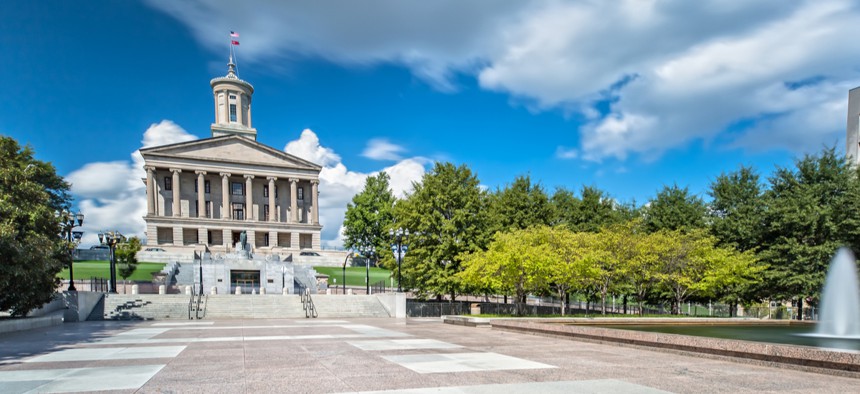Tennessee Legislature May Undo Governor’s Decision to Accept Refugees

The Tennessee State Capitol building in Nashville. Shutterstock
STATE AND LOCAL ROUNDUP | Colorado rolls out environmental pilot for marijuana and beer industries … Legislation in Maine would ease restrictions on lobster truckers … New York City may ban pesticides in parks.
Republican leaders in the Tennessee legislature are pushing a bill that would require the General Assembly to authorize any decisions made about refugee resettlement. The move comes in response to Republican Gov. Bill Lee's decision to continue resettling refugees through the Trump administration program that requires states to consent to accepting more refugees. State Rep. Ron Gant, a Republican who as assistant majority leader, said that the bill is supported by other Tennessee legislative leaders. "This is just to invoke the conversation with the governor. This is simply just respectfully asking the governor, let's hit the pause button, come before the General Assembly on anything we approve in the future,” he said. The bill also gives the General Assembly to ensure that “all applicable provisions be given retroactive application to actions taken by the governor,” potentially leading to a reversal of Lee’s decision if the bill passed. Lee has defended his stance recently, saying that those who oppose it are confusing illegal immigration and refugee resettlement. “When you start talking about this topic, you need to be informed about the difference between illegal immigration and legal refugee settlement,” he said. Democrats in the legislature, including House Democratic Caucus Chair Mike Stewart, applauded Lee for his decision to continue accepting refugees. “In this case, Gov. Lee is completely correct. We definitely do not want Rep. Gant and others making a decision that for over a hundred years has been something that the governor would handle,” he said. A federal judge put the Trump administration policy requiring states to opt-in to refugee resettlement on hold on January 15. Before that, 42 governors, including 19 Republicans, had consented to receive refugees. [Nashville Post; Tennessean]
MARIJUANA AND BEER | Colorado Gov. Jared Polis announced a pilot program aimed at reducing emissions and increasing energy efficiency in the marijuana and beer industries. Through a practice known as carbon dioxide recapturing, beer brewers would capture carbon dioxide made through the fermentation process and give it to marijuana growers, who can use it to stimulate plants. Polis said that the state is committed to reducing emissions and improving air quality. “These pilot programs combine a few of the things that Colorado is known for: environmental responsibility, craft beer and cannabis,” he said. Jill Hunsaker Ryan, executive director of the Department of Public Health and Environment, said that the pilot program “is a perfect example of the state’s willingness to embrace creative solutions and call on businesses to innovate to help build a healthier, cleaner, more sustainable Colorado.” [Marijuana Moment; CBS Denver]
LIVE LOBSTERS | Maine may change its hours-of-service restrictions for truck drivers who haul live lobsters. In a proposal brought to the state legislature by Democratic Sen. Eloise Vitelli, lobster truck drivers would be exempted from some restrictions that limit the number of hours drivers can work in a row and in a week. The goal of hours-of-service regulations is to increase highway safety by keeping tired truckers off the road, but drivers in the state say the restrictions make it impossible to get live lobsters to their destinations on time. “Getting lobsters quickly to market in Boston is essential for Maine lobster dealers to maintain and grow this iconic industry," Vitelli said. Virginia Olsen of the Maine Lobstering Union said that members of the industry are at “an economic disadvantage when trying to bring our live product to market under the current time restraints.” [Associated Press]
PESTICIDES | A measure under consideration by the New York City Council could ban the use of chemical pesticides in all city parks. The legislation comes at the same time that a community organization released a report called “Poisoned Parks,” that accuses the city of environmental racism by more frequent spraying of glyphosate, a carcinogen found in Roundup, in parks used by people of color. The Parks Department said the report isn’t accurate, but added the agency is not opposed to banning chemical pesticides. That step, however, would curb the city’s ability to manage invasive species, a deputy commissioner said. [CBS New York]
HIDDEN MAIL | It was revealed this week that a U.S. postal worker in Virginia rented a private storage unit to fill with mail that he felt “pressured” to deliver. The worker, who resigned from USPS in 2019 and pleaded guilty to charges of delay of mail, said that he couldn’t make the time to complete his mail route. Authorities found over 5,000 pieces of mail in the storage locker. [CNN]
Emma Coleman is the assistant editor for Route Fifty.
NEXT STORY: The Census Already Started in Alaska. Native Translators Are Working to Prevent Undercount Repeat






